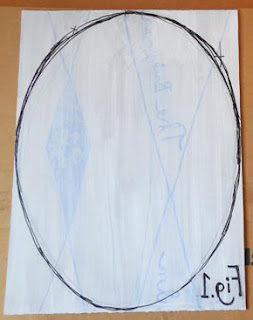 |
| Before my trip to Poland I was preparing to make a print. |
Merriam Webster states, Romanticism is " a style of art, literature, etc., during the late 18th and early 19th centuries that emphasized the imagination and emotions".
At the beginning of the year I posed three questions for myself. Two questions were answered previously. I am going to re-caste the last question and attempt to answer it.
Question Three: In relationship to imagination, what role does a personal and emotional place represent? Does a lack of interest in this realm mean that personal visions, while flavorful, are limited exercises without broader relevance?
Perhaps I am wrong, but I feel as if the deep kind of imagination that leads to unfathomable vistas, to creatures yet formed, and worlds that are hidden behind stones has somehow been lost. I am under the impression that there is a more stark focus on issues both formal and political (some examples). While I do not want to dismiss imaginative avenues within these subjects and I am generalizing, it seems that art in the vanguard of critical attention has moved from a palpable imaginative place to a more didactic message driven realm.
What surprised me most is that a trip to Poland revealed to me a critical case (if not a necessity) for imagination in current life and art. Between two trips, I read two books about Poland, The Heart of Europe by Norman Davies and the novel Poland by James Michener. The former confirmed the history of the latter. I learned how a nation maintains its nationhood when it has been taken. Poland was divided by other nations and there was a systematic attempt to replace its culture. Two philosophical perspectives help maintain the Polish identity (Positivism and Romanticism). Polish Romanticism was different then elsewhere in Europe because it had practical implications. It was part of a covert program to endure and outlive the occupying powers.
While I had read Plato's Republic, this is the first time found philosophies that reached deep into the individual and define and preserve the self. In many ways Positivism and Romanticism were two sides of the same coin (the practical and the fantastic). Granted we need both but the latter often gets maligned as folly or false hope. However, without hope we have no future at all. Even those who have to be focused on practical concerns need a sense of hope. In order to get to this exalted place, we need to investigate the self and the ongoing change that can be both regenerative and caustic.
Imagination may involve brainstorming and many seemingly random acts. However, sprawling actions and ideas can become noise that leaves one with little place to focus. I encourage my fellow voyagers to think deeply about connections. Where does the wandering lead? Do any of the connections made in the wild world of process and symbols provide the following?
- Escape routes from oppressions
- Resolve the questions too big for words
- Usurp soulless perspectives
While the notion of romanticism in our day may be pushed to a corner or trampled on, it is not merely fantasy or whim. At its deepest root, romanticism provides a vision of the life we aspire to and provides tangible evidence of a world beyond earthly bounds. We all long to swim in this collected water because it shows signs of our humanity.
